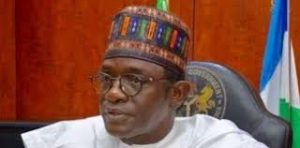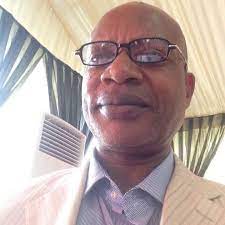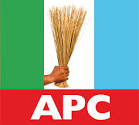By Ehichioya Ezomon
Did the Supreme Court judgment, in the appeal from the October 2020 governorship election in Ondo State, vitiate the chairmanship of Governor Mai Mala Buni of the All Progressives Congress, and pronounce the party out of existence?


That’s the claim of the opposition Peoples Democratic Party, as relayed by the party’s spokesman, Kola Ologbodinya, who, at a press conference in Abuja on Friday, July 30, 2021, declared: “The Peoples Democratic Party (PDP) alerts Nigerians and the international community that the All Progressives Congress (APC) has become technically invalidated and now lacks the statutory structure to operate as a political party in our country.
“This is given the pronouncement of the Supreme Court, which pointed to the nullity of APC’s subsistence and activities as a political party, for having a sitting governor, Governor Mai Mala Buni of Yobe state, as its Chairman, in total violation of Section 183 of the 1999 Constitution (as amended) as well as the provisions of Article 17(4) of the APC constitution.
“A further interpretation of the pronouncement of the Supreme Court showed that all activities… under Mai Mala Buni, including the nomination of candidates for elections, agreements, the official decision reached, the establishment of committees for statutory activities as well as its planned ward, local government and states congresses now hang loosely on the threat of invalidity.”
You can’t begrudge the PDP, as pronouncing APC “out of existence” would brighten its prospects of pulling off the 2023 elections that the APC, given its current spread, is likely to win.
Meanwhile, members of the APC are divided over the split decision of the Justices of the Supreme Court that affirmed the election of Governor Rotimi Akeredolu as winner of the Ondo poll in 2020. Four of the seven-man Justices rejected the appeal by Chief Eyitayo Jegede, and the PDP to be declared the winner, on the grounds that Akeredolu was invalidly nominated for the election.
The court held that the failure of the appellants to join Governor Buni as a respondent was fatal to their appeal, and affirmed Akeredolu as duly elected and returned as governor of Ondo.
But in a minority ruling, three of the Justices held that it wasn’t mandatory for the appellants to join Buni, as the governor was only a representative of the APC that’s a respondent in the matter. So, the debate is whether Buni, following the Supreme Court ruling, should vacate the chair of the Caretaker Committee/Extraordinary Convention Committee of the party, and the nationwide congresses scheduled for Saturday, July 31, be suspended until a new caretaker committee or National Working Committee is appointed/elected.
The “Buni must go” proponents argue that had Jegede and PDP joined the governor in the appeal, the APC could’ve lost Ondo, as the governor’s assumption of the committee’s chair breaches the amended 1999 Constitution and that of the APC (as amended). While Section 183 of the 1999 Constitution states that: “The Governor shall not, during the period he holds office, hold any other executive office or paid employment in any capacity whatsoever,” article 17(4) of the APC constitution stipulates that: “No officer in any organ of the Party shall hold executive position office in government concurrently.”
Interpreting both the Nigerian and APC constitutions means that Buni is “concurrently” occupying executive positions of Governor of Yobe State and Chairman of the APC caretaker committee. This is the premise of the pressure on Buni to resign from the APC committee chair, to avoid negating future actions of the committee, especially on the November 6, 2021 poll in Anambra State.
Interestingly, in its countdown to the “Anambra State Governorship Election,” the Independent National Electoral Commission lists on its website, “H.E. Mai Mala Buni and Senator J. Akpan Udoedehe,” as the Chairman and Secretary of the APC caretaker committee. On that score, the PDP has derisively “sympathized” with the APC candidate in the Anambra poll, Sen. Andy Uba, over the “misfortune of trying to journey in a political ‘one chance bus’.”
In other words, any aggrieved aspirant of the APC, questioning the nomination of the party’s candidate in the election, may join Buni, a condition alluded to by the Justices the Supreme Court, that likely cost Jegede and the PDP the governorship of Ondo State.
Besides, the ongoing APC congresses that will culminate at a national congress maybe in legal jeopardy, and stand voided from the ward to local government, state and national levels.
However, the “pro-Buni must stay” members of the APC have countered that the governor has breached neither the 1999 Constitution of Nigeria nor the constitution of the party. They contend that his appointment was made by the National Executive Committee of the APC, which has the statutory power to so appoint, and as such, all past (and future) actions by the Buni-headed caretaker committee were valid, legal and binding. Buni’s appointment to the caretaker committee was subject of litigation in an Abuja court, which on June 22, 2021, struck out two suits challenging the dissolution of the Adams Oshiomhole-led NWC, and seeking to sack the Buni caretaker committee. Ruling on the suits by the South-South National Vice Chairman of the APC, Hilliard Eta, and a former APC Youth Leader in Abia State, Kalu Kalu Agu, Justice Taiwo Taiwo held that the plaintiffs lacked the locus standi (legal right) to institute the cases against the party.
In the interim, President Muhammadu Buhari, visiting the United Kingdom, has reportedly asked Vice President Yemi Osinbajo to parley with all legal minds in the cabinet, “to douse the tension” sparked by the minority ruling of the Supreme Court on the legality of actions by the APC caretaker committee.
As reported by The Nation, Prof. Osinbajo had summoned a session with the Attorney-General of the Federation, Mallam Abubakar Malami (SAN), Works Minister, Babatunde Fashola (SAN), Minister of State for Labour and Employment, Festus Keyamo (SAN) and Information and Culture Minister, Alhaji Lai Mohammed. With no reported consensus among the cabinet lawyers, Osinbajo was expected to give a feedback to President Buhari at the weekend, even as the congresses were held on July 31 amid reports of court stoppages, impositions or parallel congresses.
Thus, the APC ignored the lifeline the Supreme Court threw at it to mend its ways, as regards Buni’s occupation of the caretaker committee chair, and allowed the governor to superintend the conduct of the party congresses nationwide.
Buni, as governor of Yobe, assumed the acting chairman of the APC on June 17, 2020, after the party’s NEC, headed by President Buhari, sacked of the Comrade Oshiomhole’s NWC “in order to resolve the crisis in the party.”
Watchers of the polity had warned that Buni’s headship of the APC caretaker committee could be an albatross on the party’s neck. But the APC and its leadership didn’t listen. Since then, the APC has weathered series of litigation from aggrieved members to dislodge Buni and dissolve the caretaker committee, which had conducted in-house electoral matters, including the primary of the 2020 poll in Ondo and Anambra.
The Supreme Court’s ruling on the causes from the Ondo election has highlighted the “flaws” in Buni’s chairmanship of the caretaker committee, and prompted the debate as to why the governor should vacate the position, and the APC congresses postponed.
Is the chicken coming home to roost? Winning the raging argument in a divided APC may ultimately depend on the courts should aggrieved members institute actions against the party and officers of the caretaker committee.

- Ezomon, Journalist and Media Consultant, writes from Lagos, Nigeria.




GIPHY App Key not set. Please check settings